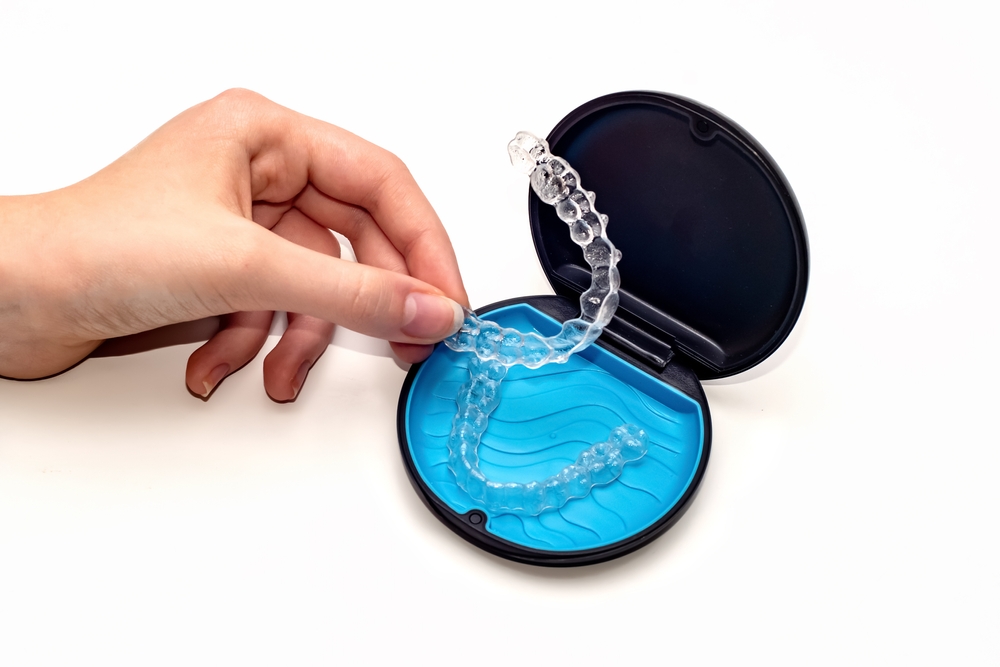My Front Teeth Aren't Crooked: Do I Still Need Orthodontic Treatment?

Many patients wonder if orthodontic treatment is needed if their front teeth are not crooked. Orthodontic treatments like braces or Invisalign® have many benefits and aren't just for correcting aesthetic concerns.
Learn how braces or Invisalign at Premier Dental and Implant Center in Orland Park, IL, can help with issues that impact the function, health, and appearance of your smile.
What Can Braces or Invisalign Address?
Even if your front teeth aren't crooked, there are several other reasons why orthodontic treatment may be beneficial for the health and function of your smile, including patients with:
- Bite Issues — Bite issues, also known as malocclusion, include issues such as an overbite, crossbite, underbite, and open bite. Malocclusion can impact the function of your mouth, cause excessive wear on your teeth, and put stress on the temporomandibular joints (TMJs); this can lead to pain and oral health issues such as damaged teeth, decay, and even tooth loss.
- Crooked Back Teeth — While your front teeth may not be crooked, your back teeth may be, which can make it difficult to brush and floss properly. Improper brushing can lead to oral health issues such as gum disease, tooth decay, and even tooth loss.
- Gapped Teeth — Gapped teeth can cause speech issues, making it difficult to speak properly.
- Narrow Palate — The palate is the roof of your mouth. When it is too narrow, several issues can develop. Orthodontic treatment can often help address this issue. In more extensive cases, surgical intervention may be needed.
Take a Closer Look at Bite Issues
An improper bite is a major reason why patients may undergo orthodontic treatment, such as braces or clear aligners like Invisalign.
- Underbite — An underbite occurs when the bottom teeth protrude past the top teeth.
- Overbite — An overbite is the opposite of an underbite. In this case, the top teeth extend past the bottom teeth more than they should.
- Crossbite — When one or more teeth don't line up properly, this is known as a crossbite.
- Open Bite — You may have an open bite if your back molar touch but there is a gap between the front top and bottom teeth.
Why It's Important to Treat Bite Problems
So why does your bite matter? A misaligned bite is not just an aesthetic concern. Bite issues can also cause pain, excessive wear on the teeth and jaw joints, and difficulty eating and speaking properly. In severe cases, tooth loss can occur, which can cause jawbone deterioration. This is due to the stress of chewing on certain teeth caused by the misalignment. Grinding or clenching can also result from misalignment, which can damage your teeth.
Misalignment can lead to the need for more extensive dental work, such as dental crowns, dental implants, and more. Orthodontic treatments like braces and Invisalign put the jaw in proper alignment, allowing you to chew and speak correctly. By reducing the strain on your jaw, we can eliminate or minimize TMJ disorder symptoms and excessive wear on your teeth.

Misalignment Can Cause Sleep Apnea
In some cases, a misaligned bite can cause obstructive sleep apnea as the jaw and tongue are not able to sit properly and obstruct the airway in some form. Braces and Invisalign can help ease the symptoms of obstructive sleep apnea by putting the jaw and teeth into a proper alignment.
If you have a misaligned bite, signs of sleep apnea can include:
- Trouble sleeping
- Dry mouth when waking up
- Headaches and jaw pain
- Fatigue
- Sore throat after waking
- Choking or gasping in the night
- Snoring
- Episodes at night when you stop breathing
How Do I Know If I Need Braces or Invisalign?
If you think you may need braces or Invisalign, the first step is a consultation at our Orland Park dental practice, where I or another one of our dental experts can examine you. During this exam, we will look at your teeth and bite. We may also take X-rays and images using cone beam computed tomography (CBCT) imaging to get a full picture of your jaw and mouth in order to devise a custom treatment plan.
Whether you qualify for braces or Invisalign will depend on several factors, such as:
- The severity of your issue — Invisalign treatment is best for mild-to-moderate orthodontic concerns. If you have severe issues, braces may be a better option.
- The patient's level of responsibility — Because Invisalign aligners are removable, you must be responsible enough to maintain and wear them for at least 22 hours a day. Young children are often not a good fit for Invisalign because of this.
- If you need preparatory treatment — Issues such as tooth decay and gum disease must be addressed before orthodontic treatment can proceed. If you have overcrowding, tooth extraction may be needed. These preparatory treatments help to ensure a healthy foundation, can prevent complications with treatment, and give you the best possible chance of success.

How Long Does Orthodontic Treatment Take?
Again, this depends on the severity of your dental issues. Mild orthodontic issues can be corrected with Invisalign in as little as 12 to 18 months, while more severe concerns may require you to have braces for 24 months or even longer.
While this may seem like a long time, the benefits and results can last a lifetime. Once your treatment is completed, a retainer should be worn at night. This will help to maintain your results and prevent your teeth from shifting out of place.
Transform Your Smile With Orthodontic Care
Orthodontic treatments such as braces and Invisalign can enhance the overall appearance of your smile. However, even if the aesthetics of your smile are not affected, malocclusion can impact your oral health and function and could even cause headaches and sleep apnea. Orthodontics can improve your quality of life and prevent the need for more extensive treatments such as restorations and dental implants.
Get the Answers You're Looking For
Contact Our Dental Office Today
If you aren't sure if braces or Invisalign are right for you, request a consultation at our Orland Park practice. Our dentists provide comprehensive treatment options to address a variety of concerns in one convenient location. We tailor treatment plans to address your specific concerns and oral health goals. We look forward to helping you achieve the healthy, beautiful, and functional smile of your dreams.
 About Yamen Akhras, DDS
About Yamen Akhras, DDS
Dr. Yamen Akhras completed training in dental implants from the Misch Institute and the Urban Regeneration Institute. He specializes in treating gum disease, placing implants, and bone and gum grafting.
Read Dr. Akhras's Full Bio | All Posts by Dr. Akhras

